It is a common tactic of TV drama series to gleefully layer story upon story as their episodes continue, like an over-zealous baker with a cake. Adding in characters, revealing twists and unexpected backstories is the bread and butter of good narrative storytelling. But, if these layers cannot come together, or at least connect in some way, you end up with a pile of question marks rather than satisfying resolutions. This is the exact problem that TvN’s Hometown comes up against, a hurdle that it ultimately does not manage to jump.
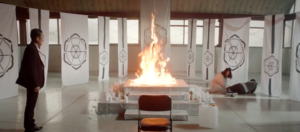
The second half of this procedural-come-horror series veers dramatically into the latter of these two genres, focusing its attention on the fictional town of Saju and it’s mysterious Youngjingyo cult, its mystical leader ‘Guru’, and the terrorist killer who seems to be behind it all. There is, naturally, more space for emotional development and character arcs as the story reaches its climax, though the impact of this is often lost in a foggy narrative. Unclear writing, time jumps, and lack of clear explanation make Hometown a disappointment, where there could have been exciting ideas.
This Youngjongyo cult established in the show’s first half quickly becomes the epicentre of its second, though without a consistent, thorough exploration of exactly what it is at any point. Led by main character Jo Jung-hyun (Han Ye-ri)’s old school friend Jung Young-seob (Lee Hae-woon), deranged by his dedication to the mysterious ‘Guru’ figure that seems to possess godly knowledge, the cult is white-robed and suitably ominous. It is this cult that has actually kidnapped Jung-hyun’s niece Jae-young (Lee Re) and appears to see her as the heir apparent to this mysterious figure.
The very notion of kidnapping a child and forcing her to attempt ‘enlightenment’ (what this means is never fully explained) is, of course, menacing, but what is clearly intended as terrifying ambiguity around the cult’s true nature ultimately reads as poorly constructed. As the episodes continue, suspense does build effectively to suggest a big reveal about the cult’s real intentions, but this comes in sputters rather than a satisfying burst.
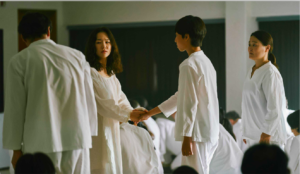
The closest the show really comes to a revelatory moment in this storyline is towards its close, where Jung-hyun has offered herself as a substitute for the heir in order to replace Jae-young. In a moment where she is expected to perform a ritual, she instead talks to the congregation around her, learning they’re all family members of those who died in the 1987 Sarin gas attack her brother carried out on the town. As they tell their stories, she listens and apologises profusely, exposing her own humanity and showing the vulnerability and grief that has led these people into this—potential—death cult. It is the most humanistic insight we get into characters who otherwise serve as, essentially, an ominous backdrop to the actions of the main characters. Han Ye-ri’s performance in this scene is some of her strongest work, displaying deep and complicated emotions under intense restraint and scrutiny.
Aside from small moments like this, however, the cult is mostly used in the show as a vehicle for the evil deeds of the protagonists. This is not entirely an unwitting choice, as the central villain Jo Kyung-ho (Um Tae-goo), frequently compares these members, as well as most other people around him, to ants. A classically blank-faced psychopath stock character, to Kyung-ho the town’s residents are as insignificant and controllable as these insects, which at times spills over into literal imagery of ants crawling over surfaces and hands.
Portrayed as extremely calm and softly spoken, Kyung-ho’s character comes directly from the Hannibal Lector line of too-smart-for-the-room killers. He similarly spends a large portion of the series manipulating anyone he comes into contact with, simply through his intense hypnotic powers. Much like the nature of the cult, exactly what these powers are, how they work and where he got them remain fuzzy at best. The only real consistency to them is their efficiency rate: if this guy wants you to stab a nurse with a scalpel, boy are you going to do it.
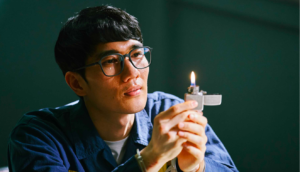
The blurriness around these powers is reminiscent of another famous murderer—Michael Myers—as they serve to make him seemingly impervious to everything in this universe. The problem with this here is ironically a total lack of tension: we know he’ll do what he wants with anyone he talks to, and we know he’s not the nicest guy, ergo, he’s going to do something dastardly. Um Tae-goo’s performance is clearly aiming for chillingly detached, but with this predictability in the narrative, this turns into something unengaging instead.
Unfortunately, the same is true of our central detective, Choi Hyung-in (Yoo Jae-myung). The grizzled and haggard detective of the show’s first half certainly has an arc as the series moves along–for example, it is revealed the ghostly woman characters see before they murder their loved ones and then themselves is his dead wife. There is a lot of backstory given to this, involving pregnancy, estrangement and murder, plenty of potential for a character’s soul to become exposed. However, throughout the drama, Hyung-in’s tone and manner barely ever alter. This is most jarring in the flashback scenes where he is theoretically living in bliss with said wife, but the performance from Jae-myung reads almost as identically downbeat as any other scene in the show.
These two performances reading as flat are not entirely the fault of the actors, as the show’s writing does not give them sufficient room to explore other modes and moments of their characters. The flashback scenes with Hyung-in are scattered in unevenly and not effectively contextualised. Kyung-ho’s backstory is even more slipshod, mostly being relayed in his own, or others’ conversations. There is a striking scene where we see him and his sister as children in front of a pool filled with dead bodies, but even this appears far too briefly to be understandable. Many of the show’s flashbacks suffer in this same way, blurring the lines between past and present in a way that confuses rather than adding anything.
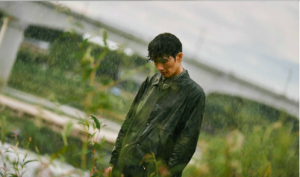
Part of this is due to the overall mis-en-scene of Hometown. Initially it seemed as though the lack of definition in timeframes was to suggest a continuity, even repetition, of the past in the present. The washed-out colour saturation is largely the same (though sometimes slightly more sepia in the past), the framing does not change and the styling of the characters remains remarkably similar. Even the rain seems to fall as much in 1999 as it did in 1987.
Whilst the show’s main storyline does centre around the exact idea of the past repeating (the cult aims to repeat the ’87 Sarin gas attack in 1999), there is not enough direct signposting or paralleling in the cinematography for it to echo this idea. The two worlds of the past and present are comparable, but with no eeriness because they feel like one continuous moment. The buildings do not change and the lens through which we see this world hardly changes either. If distinctions had been more clearly defined between past and present, their similarities would have been more striking. We don’t enter two houses that creepily resemble each other here: we just stay in the same house.
Hometown’s greatest effort to avoid this comes from the casting of young actors to play the core magazine club in 1987, whose investigations discover elements of the cult, with older actors as their 1999 counterparts. Of course, this is a clear distinction between timeframes, right? Well, yes, and with the main character of Jung-hyun, it works well, due to the consistency of the two actresses’ performances and her prominence in the storyline. But for our other characters, this duality fails to add anything.
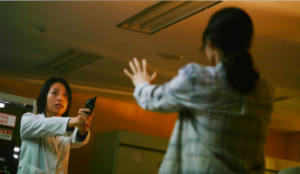
Part of this is due to the inherent difficulties of casting people to play younger versions of adult actors: they both need to have a strong enough physical resemblance and enough skill to mimic elements of each other’s characters. But again, because the writing has created such an overly confusing web of plot and character, this largely isn’t possible. It works for Jung-hyun’s character as she is the show’s lead, but for Young-seob, forlorn lover Yong-tak (Cha Rae-hyoung) and friend-turned-crazed cult believer Jung Min-jae (Kim Jung), there is not enough background given for their present actions to have impact. It is difficult to really connect them to the past, and thus their actions often feel unfounded.
This is the core of all of the issues Hometown ultimately has. The writing of many of the characters and their stories, is not given enough structure to be clear. This might be less of a problem if these characters were well-rounded in individual scenes, but, of course, those too would involve a structure that the writers have clearly missed. The younger characters still provide the most engagement through their natural effervescence—by far the most touching scene is when Jae-young reunites with her friends—but it isn’t enough.
One is left desperately trying to trace back what happened in each scene to explain its climax, feeling like something has been missed. But when a story has been written well, this lack of satisfaction shouldn’t be there. Hometown made a bold attempt to mix in true horror with crime and cults with complexity and depth, but forgot these qualities don’t just come from throwing in more and more information at a story. They come from fully fleshed-out stories and understandable people with understandable emotions. A simple story told well is better than an intricate web that can be easily blown apart, which is the ultimate fate of Hometown, ghosts, cults, murderers and all.
Images via TvN.


